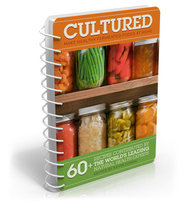
The new fermented foods book from Renegade Health features The Kombucha Mamma!
Fermented foods are as old as mankind. The bacteria present in them have co-evolved with humans and their role in our long term health is just now being discovered by the Human Microbiome Project.
In short, our body doesn’t survive very well without beneficial bacteria to literally tell it how to behave. Once one understands the roles of bacteria in every normal function of your body, it becomes much easier to see the urgent need to include fermented foods in your diet on a daily basis.
Fermented foods have assisted humankind in three ways:
- They preserve food from the harvest so that we might survive the long winter,
- They predigest portions of the food to make it easier for us to break down in our stomachs and store the energy, and
- They boost the nutritional value of the original food.

Sandor Katz and Jenny McGruther helped out on the People’s Kombucha Awards tasting panel at the Freestone Fermentation Festival
Amazing! 🙂
Before the advent of refrigerators or as my friend Sandor Katz calls them “Fermentation Slowing Devices,” (in case you missed it, here is my conversation with Sandor about fermented foods) humans had to find other ways to preserve food from spoilage.
Most of the time this was in order to survive through periods of food scarcity such as winter or drought. Bacteria from the soil or wild yeasts from the air are common innoculants. Sauerkraut is an excellent example. Bacteria found on the leaves of the lettuce convert it to the tasty condiment, no starter is needed.
Many grains and legumes are difficult for the body to digest without undergoing some type of chemical transformation. Soybeans for example contain phytic acid which is indigestible and blocks the absorption of key minerals such as calcium and zinc. In fact, soybeans have traditionally only been consumed in a fermented form as soy sauce, tofu, natto or tempeh.
Jenny McGruther of Nourished Kitchen writes:
Since souring grains reduces the phytic acid content, the lactic acid fermentation process actually enables your body to absorb more minerals from the grain than you would be able to otherwise absorb. The end result is that you get more bang for your nutritional buck by souring the grains you eat.
********
Cultures all over the world have special fermented foods and sprouted grains unique to their regional cuisine. Somehow in the migration of other cultures to the United States, many of these healthy traditions were lost in the melting pot. Several fermented staples such as pickles, ketchup and sauerkraut lost their healthy bacteria when they were turned into mass produced processed foods.
I believe Kombucha is a gateway to other fermented foods. For many people, making Kombucha at home can be a way back into the kitchen, back into health and a step toward learning about other simple & nutritious ferments. If you love Kombucha and have wanted to try your hand at other fermentation then check out the new “un”-cookbook Cultured, edited by alternative health advocate, Kevin Gianni.
Gianni and his powerhouse wife Annmarie are also the hosts of the Renegade Health Show and authors of several books. Recognizing the exploding popularity of fermented foods, they invited a few gurus (yours truly included) to contribute the best fermented food recipes and brought them together in one comprehensive volume.
From pickles to kim chi, kombucha (who could that be? ;)) to kefir, the recipes cover the entire gamut of fermented treasures. Available as a download, soft cover or get both and save!
Here are Kevin Gianni’s Top 7 Reasons why you should include more fermented foods in your diet today:
1. Fermented foods have amazing health benefits.
Something pretty amazing happens when you let foods ferment. They turn themselves into superfoods. Fermented foods contain many more healthy compounds such as enzymes and B vitamins that aren’t in the initial medium (what you started with!)
The health benefits are many and include boosting the immune system, reducing inflammation, better digestion, better skin, decrease or elimination of acne, elimination of gas and bloating, improving mood, improving allergy symptoms and more. As you can see, this is why I consider them possibly one of the best superfood categories on the planet.
Adding these types of foods – there are many, so take your pick – into your diet daily may be on of the most powerful thing you can do for your diet.
2. Anyone can make them.
If I can make fermented foods, so can you.
The only foods I’m proficient at preparing are salads, smoothies, and fermented foods. This may give you a good idea of how simple fermented foods are to make.
My favorite part is that you don’t have to stand around and actively “make” them. The healthy bacteria contained in them do all the work!
The preparation is the work you need to do, which is generally pretty easy as well…
3. They take minutes to prepare.
Most fermented food recipes literally take minutes to make. Usually, the extent of making them requires just a little chopping, a quick blend (if you’re making a brine) and adding a culture starter (some don’t even require that!)
The rest of the work is done by the bacteria. Imagine having a team of trillions of little chefs to prepare your meals every day. (Well, maybe a trillion would be too much for your kitchen.)
4. Fermented foods help rebuild your digestion.
One of the major benefits of eating fermented foods is that they have been shown to improve digestion. If you have stress, have taken antibiotics, drink tap water (now or in your past), or taken many other medications (over-the-counter or prescription) chances are your digestion is impaired.
Fermented foods can boost the number of healthy bacteria in your gut which will help you digest your food better, reduce gas and bloating, and help you get more nutrition from you food.
5. They taste amazing.
While I like to stress the health benefits of foods, let’s take a step back and look at the most basic of all things when it comes to fermented foods.
They taste great!
Sauerkrauts and cultured vegetables are savory and delicious. Fermented drinks like kefirs, chichas and kombucha are refreshing and nutritious. Gluten-free breads like injera and idli are filling and hearty.
Each cultured food has it’s own distinct taste, so it’s up to you to experiment and find which ones you enjoy best.
6. Cultures have used them for thousands of years.
For thousands of years, cultures have been using fermented foods as a way to preserve fresh food. One thing they learned over time is that through this process, the food also had added benefits. So when you eat fermented foods you’re not only tapping into thousands of years of food history, you’re also tapping into the ancient wisdom that has been passed along with the creation of these foods.
7. Reduces inflammation and disease.
Ultimately, we all want to live as long as possible as healthy as possible. One of the biggest markers of disease is inflammation. Inflammation is something that even the stiffest of medical professionals can understand as being a factor in the cause of disease.
When you can eliminate or reduce inflammation in the body, your chance of getting sick decrease dramatically.
Eating fermented foods and healthy bacteria has been shown to reduce this disease causing inflammation – in turn keeping you healthier for longer.
With all these reasons and literally dozens more, it’s easy to understand why fermented foods will work for you and your schedule.
Discover how easy it can be to feel good on a daily basis through the consumption of nutritious fermented foods.


Eve
September 5, 2018 at 7:26 pmOh how I love fermenting. Milk turns into kefir, which gives me soft cheese and wonderful whey. Beautifully browned garlic cloves are a taste divine. Apples are fermenting in kombucha as my dill crock is “cooking” away. And my sour dough starter is ready for the next loaf. 64 years old and fermenting and sharing the excess of starters, and grains and scobies, and etc.
james barrett
October 4, 2011 at 12:27 amAlthough I ferment green tea to make lots of kombucha, I also make fermented pickles using both cucumbers and okra. These pickles taste great and are easier to make than canned pickles.
hannah
October 11, 2011 at 7:39 amAre you making the pickles with Kombucha or a starter culture such as whey? Do share your recipe!
Nancy
September 28, 2011 at 5:25 pmMilk kefir, water kefir, sauerkraut, pickles, kale. And, yes, I’m preparing them myself. Have lots more to learn, but feel great!! No more allergies!